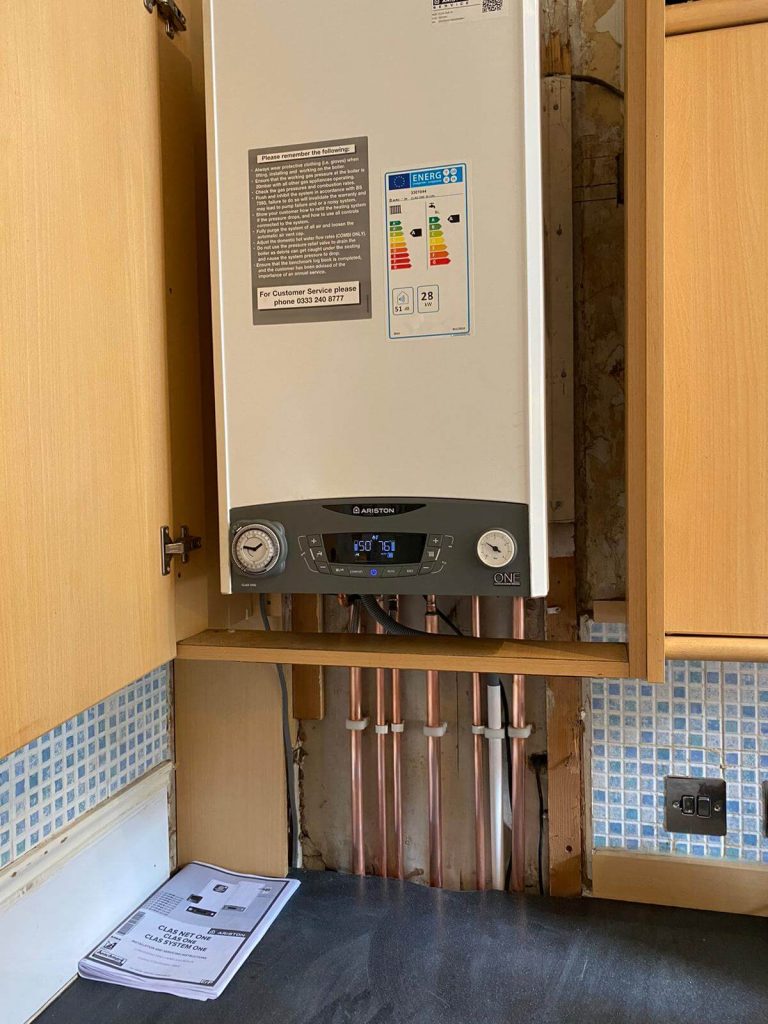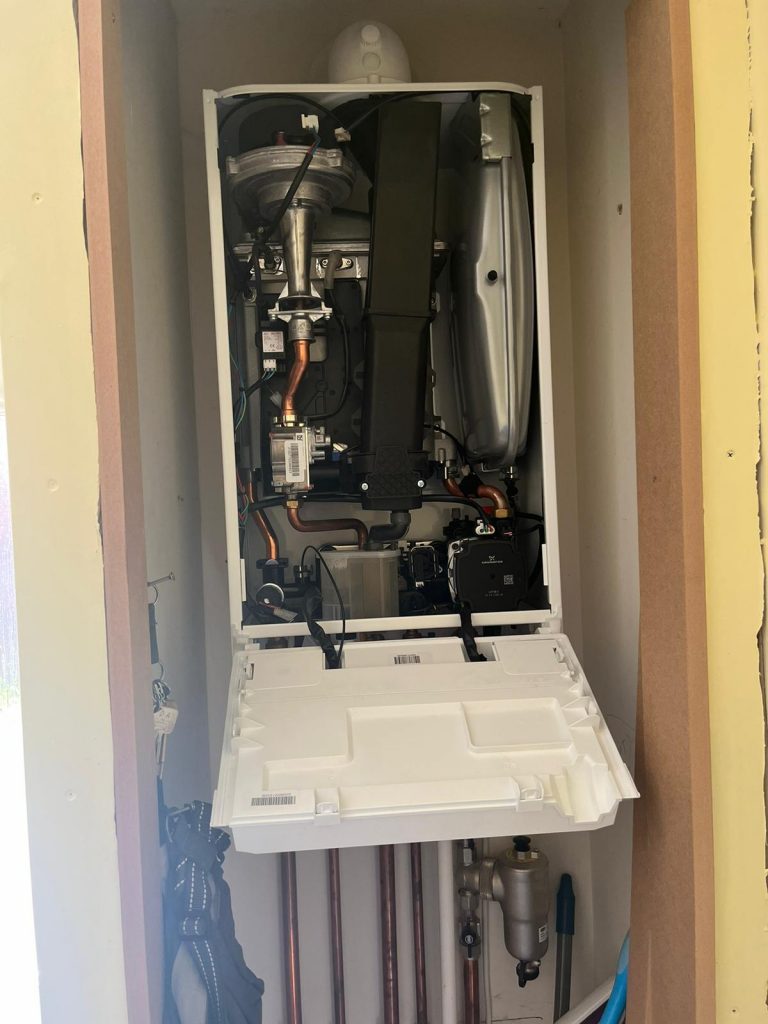What is a Combi Boiler? – Discover How it Works its Magic!
Welcome to the future of home heating! Imagine a single, compact unit that not only heats your home efficiently but also provides hot water whenever you need it. No more waiting around for the water tank to heat up or dealing with bulky equipment taking up precious space. This device is known as a combi boiler, short for combination boiler. But what exactly is a combi boiler and how does it work?
This article answers that question and more. It covers everything from the mechanics to the technology behind this device and explains why so many homeowners are making the switch. Whether you’re renovating, considering an upgrade, or simply curious about the latest in heating solutions, this guide covers it all.
What is a Combi Boiler?
A combi boiler, short for combination boiler, is like a Swiss Army knife for home heating, combining central heating and hot water into one compact unit. This is why they top the list of preferred choices in the UK. If you’re wondering what a combi boiler is in the UK, it’s essentially a system that does away with bulky storage cylinders and tanks, freeing up valuable space in your home. Additionally, these sleek devices can be tucked away in a boiler cabinet or kitchen cupboard while providing instant hot water whenever you need it. So, what’s the magic behind this space-saving marvel? Let’s dive into how a combi boiler works its wonders.

What is the difference between a combi boiler and a normal boiler?
When it comes to choosing between combi boilers and regular boilers, the differences are pretty clear. Regular boilers, commonly found in older homes, are becoming less favoured due to their size and complexity. They require separate hot water and cold water tanks, which are typically placed in the loft. This setup not only takes up a lot of space but also makes installation more complicated.
In contrast, combi boilers offer a sleek, modern alternative. They heat water directly from the mains on demand, so there’s no need for additional tanks cluttering your space. This makes combi boilers an excellent choice for smaller homes or those with modest hot water needs. However, if your household has multiple bathrooms and a high demand for hot water, a regular boiler’s large storage tank might be more suitable.
If you’re curious about the pros and cons of each boiler type, you can explore our comprehensive guide on combi vs conventional boilers here.
How does a Combi boiler work?
A combi or a combination boiler might seem straightforward, but it’s actually a smart system that handles both your heating and hot water needs. You might ask yourself, does a combi boiler run on gas or electric? Depending on your setup, it could use either, but the way it operates is fundamentally the same.
Fuel Ignition and Heat Production:
When you turn on a tap or kick start the heating, the combi boiler springs into action. If it’s powered by gas, it ignites the fuel; if it’s electric, it heats up the elements. This heat then gets absorbed by the boiler’s heat exchangers.
Heating the Water:
Water comes into the boiler from the mains and travels through pipes inside the heat exchangers. The heat, whether from burning gas or electrical elements, warms up the water as it flows through these pipes. Afterward, a diverter valve directs the hot water either to your taps for instant use or to the radiators to warm up your home.
Water Circulation and Efficiency:
Once the water has circulated through the radiators and warmed your space, it returns to the boiler for reheating. This continuous process ensures that your combi boiler keeps providing hot water and efficient heating throughout your home, regardless of whether it uses gas or electricity.

Ideal Temperature and Pressure Settings for Your Combi Boiler
To get the best performance from your combination boiler, it’s important to set the right water temperature and pressure. So, what is the ideal water temperature for a combi boiler? For heating, aim for around 60°C (140°F), and for hot water, between 40-50°C (104-122°F). This range ensures your home stays comfortably warm and your hot water is perfect for showers and washing, all while avoiding energy waste and reducing the risk of burns.
As for pressure, knowing what is the ideal pressure for a combi boiler helps keep things running smoothly. Typically, you should maintain a pressure of 1.0 to 1.5 bar when the system is cold. It’s normal for the pressure to rise a bit when the heating is on, but it should stay below 2.0 bar. This helps prevent issues like poor heating performance or potential damage.
Advantages of a Combi Boiler
Compact and Space-Saving:
If you’re tight on space, combi boilers are a game-changer. These smart units combine heating and hot water into one compact design, eliminating the need for bulky cylinders and tanks. Whether you’re fitting it into a small cupboard or a cosy corner, a combi boiler’s design is perfect for tight spaces.
Hot Water on Demand:
Say goodbye to waiting for hot water! Combi boilers provide hot water instantly from the mains, making it easy to enjoy a warm bath or shower without delay. Curious if a combi boiler can fill a bath? Generally, yes, provided your home isn’t too large. This on-demand hot water feature means you don’t have to preheat water, giving you a steady supply whenever you need it.
Energy Efficient:
Combi boilers are renowned for their energy efficiency. They heat water only when needed, avoiding the waste of maintaining a large tank of hot water. Wondering if combi boilers use more gas? They often use less, thanks to their efficient on-demand heating. This approach can lower your energy bills and reduce your carbon footprint, making your home more eco-friendly.
Lower Costs:
Wondering if combi boilers are expensive to run? While their installation often comes with lower costs, thanks to the elimination of extra tanks and cylinders and reduced pipework, combi boilers also prove to be economical in the long run. The quicker and more affordable setup not only reduces initial expenses but also contributes to lower running costs. Their efficient design means they’re generally kinder to your wallet, making combi boilers a smart choice for both upfront and ongoing savings.
Reduced Risk of Leaks:
Concerned about leaks? Combi boilers minimize this risk by not using a separate hot water storage tank. Their integrated design reduces the chances of leaks and water damage. Fewer components mean fewer potential issues, offering peace of mind and simpler maintenance. Plus, fewer components often translate to lower maintenance costs in the long run, making combi boilers a reliable choice.
Overall, combi boilers offer a smart, efficient solution for managing heating and hot water, saving you space, money, and hassle.
What is the downside of a combi boiler?
A combi boiler is fantastic for saving space and being energy-efficient, but it does come with some quirks. It heats water on demand, so if you’re trying to use multiple fixtures at once, like showering while the washing machine is running, it might not handle the load very well. Plus, if your water pressure is low, you could see a dip in performance, and in bigger homes with several bathrooms, it might struggle to keep up. Still, for smaller homes or apartments, its compact design and efficiency make it a smart, practical choice that many people find incredibly convenient.

Wrapping Up…
All in all, a combi boiler might be the game changer you need. Whether you’re wondering if it’s worth upgrading to a combi boiler or need help with any existing boiler issues, we’re here to help. Our friendly team is ready to provide expert advice and personalized solutions to determine if a combi boiler is right for your home.
Addressing maintenance now can prevent costly repairs down the line and keep your home warm and comfortable. Get in touch with us today, and let’s ensure your heating system stays in excellent condition.





 ENDORSED BY Which? TRUSTED TRADERS
ENDORSED BY Which? TRUSTED TRADERS
















